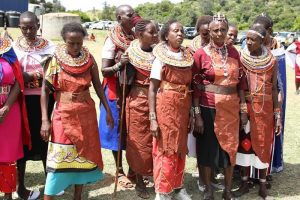Government urged to allocate more funds to support the fight against GBV
Civil society and gender-based activist Shamalla Immaculate has urged both county and national governments to allocate more funds to support the fight against gender-based violence (GBV) in Western Kenya.
Speaking to the press on Saturday after a one-day training session on gender-sensitive reporting for journalists in Kocholia, Teso North Sub County, Immaculate also called on the media to amplify GBV cases and provide inherent solutions and suggestions to promote safer environments for men and boys.
“Journalists play a crucial role in setting the agenda, acting as the eyes and mirrors of the community. Members of the fourth estate are vital in informing society and encouraging the community to instigate change, leading to transformation,” she stated.
She added, “Another important aspect of journalism is education, which empowers citizens to engage with civic issues, including public participation, to reverse the trend that has seen Western Region take the lead in GBV cases in Kenya. This issue is linked to poverty and a lack of civic education, as outlined in the County Government Act.”
Immaculate expressed concern over the inadequate budgeting for GBV issues, questioning the leaders’ responsibility to address these concerns instead of allowing them to catalyse a movement.
The human rights activist noted that journalism shapes public perception, amplifying the voices of the underrepresented, marginalised, and minority groups.
Immaculate highlighted that 60% of the population in Kenyan prisons consists of youth, which hampers development. She emphasised that gender-sensitive reporting should be inclusive, balanced,
and ethical. The language used must be empowering, avoiding gender-blind terminology and expressions that demean.
Busia County was the final stop for the 16 Days of Activism, which included training for journalists to highlight GBV cases and involve stakeholders in efforts to end the vice and advocate for increased budgets to address the issue. The campaign began with a demonstration in Trans Nzoia County before spreading to other counties in Western Kenya.
Immaculate noted that boda boda riders could play a pivotal role as champions in the fight against GBV at home, given that they often provide transport for victims, regardless of gender.
She thanked journalists in Busia for their coverage of GBV cases and urged the government to ensure a conduciveand secure environment for media stations.
Belinda Ondisa, programme manager of the Free Pentecostal Fellowship in Kenya (FPFK), expressed disappointment over the lack of statistics regarding GBV among men and boys, stating that even the international community does not acknowledge this issue in the country.
“Our society is patriarchal. Traditionally, the focus has been on empowering women and girls. However, there is a paradigm shift; men and boys are now victims of GBV, highlighting the need to empower them,” she remarked.
Boda boda rider Andrew Imojir attributed the low statistics concerning men and boys to the stigma surrounding reporting such cases, as it is often viewed as taboo for a man or boy to report violations by a woman or girl.
Another boda boda rider, Geoffrey Marago, noted that some mothers exacerbate their husbands’ depression by prioritising school fees for their children over Christmas shopping, which can lead to GBV.
Dennis Wafula from FPFK stated that women often contribute to rising suicide rates among men due to high demands, underscoring the importance of educating them to reverse this concerning trend.
The post Government urged to allocate more funds to support the fight against GBV appeared first on KBC.




